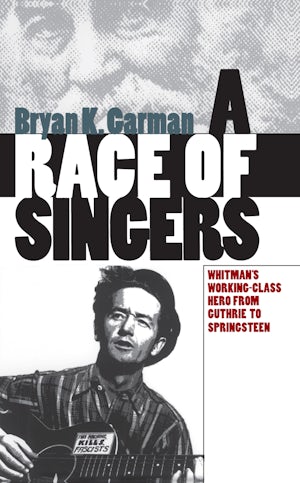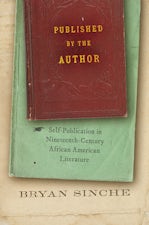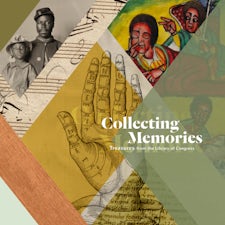A Race of Singers
Whitman's Working-Class Hero from Guthrie to Springsteen
By Bryan K. Garman

352 pp., 6.125 x 9.25, 14 illus.,, notes, bibl., index
-
Paperback ISBN: 978-0-8078-4866-1
Published: September 2000 -
E-book EPUB ISBN: 978-1-4696-4377-9
Published: July 2018 -
E-book PDF ISBN: 979-8-8908-7199-2
Published: July 2018
Cultural Studies of the United States
Buy this Book
- Paperback $42.50
- E-Book $29.95
While Whitman's verse propounded notions of sexual freedom and renounced the competitiveness of capitalism, it also safeguarded the interests of the white workingman, often at the expense of women and people of color. Garman describes how each of Whitman's successors adopted the mantle of the working-class hero while adapting the role to his own generation's concerns: Guthrie condemned racism in the 1930s, Dylan addressed race and war in the 1960s, and Springsteen explored sexism, racism, and homophobia in the 1980s and 1990s.
But as Garman points out, even the Boss, like his forebears, tends to represent solidarity in terms of white male bonding and homosocial allegiance. We can hear America singing in the voices of these artists, Garman says, but it is still the song of a white, male America.
About the Author
Bryan K. Garman, who received his Ph.D. from Emory University, is chair of the history department at the Sidwell Friends School in Washington, D.C.
For more information about Bryan K. Garman, visit
the
Author
Page.
Reviews
"[Garman] . . . has produced a strong work of scholarship that encourages us to think about the many 'traditions' that defined American music in the twentieth century."--Journal of American History
"[An] interesting study. . . . Very well written and admirably researched."--Journal of the American Studies Association of Texas
"Well written, well researched, and provocative, this book provides an interesting interpretation of three popular music icons and their connection to the Whitman tradition."--Library Journal
"A Race of Singers contributes tremendously to our understanding of the ways in which Whitman's much-discussed male homoeroticism is really part of a larger formulation of white male working class community. A major contribution to masculinity studies."--Cecelia Tichi, Vanderbilt University
"Garman captures Whitman's heritage in all of its light and its shadow, its soaring lyricism and its ominous silences. Acknowledging the genius and power of Whitman's example, this fine study of artistic influence also shows how social forces shaped the reproduction of a manly and individualistic cultural radicalism across generations."--David Roediger, University of Minnesota



